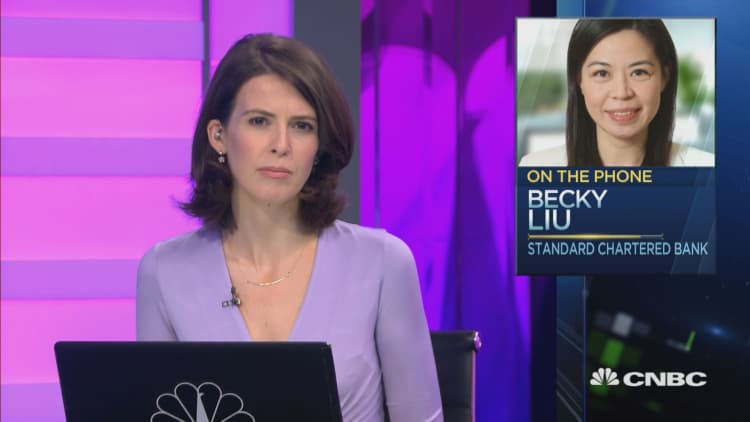
While U.S. President Donald Trump could realistically attack the Hong Kong dollar's peg to the greenback, the cost would be "very high," said Becky Liu, head of China macro strategy at Standard Chartered Bank.
Last week, Bloomberg reported that Trump aides had dropped the idea due to inadequate support and concerns about implementation as well as whether the move would backfire. Bloomberg had previously reported that top advisors had considered undermining the peg in weighing potential retaliation for China imposing a national security law in Hong Kong.
Two methods the White House could use to damage the peg would likely backfire, Liu told CNBC's "Street Signs" on Wednesday.
One approach would involve the U.S. undermining Hong Kong exchange funds' ability to hold U.S. dollar-denominated assets, said Liu. "But impacting one of the world's largest reserve managers' ability to hold U.S. dollar reserve assets would seriously undermine U.S. dollar's role as the international reserve currency," she added.
The Trump administration could also undercut Hong Kong banks' ability to obtain the greenback or strip them of their ability to conduct dollar clearing activities. But that would hurt the international financial markets "too severely" and could bring about an international financial crisis, she added.
The market however should not rule out the possibility that the Trump administration could restrict some banks —particularly Hong Kong branches of Chinese banks — from accessing U.S. dollar liquidity or from conducting dollar payments, she said.
'Hong Kong dollar is China's U.S. dollar'
Amid geopolitical tensions between the U.S. and China, Liu said the "Hong Kong dollar is China's U.S. dollar."
Last week, Trump signed legislation to impose sanctions on China. The law, dubbed the Hong Kong Autonomy Act, would slap mandatory sanctions on Chinese officials and companies that helped back Beijing's imposition of a security law. Secretary of State Mike Pompeo has repeatedly criticized the national security law in Hong Kong, calling it "Orwellian."
Liu said companies on the U.S. entity list would want to avoid some direct dollar risk exposure — and the Hong Kong dollar has become the best alternative.
With Chinese companies potentially delisting from U.S. exchanges, the Hong Kong market has become the best alternative for companies looking to raise funds in foreign currencies other than the Chinese yuan.
As Hong Kong's foreign exchange reserves are among the largest globally, the currency of the Chinese special administrative territory is "difficult to attack," said Liu.
"As such, it has become one of the alternative best currencies for those Chinese companies who cannot avoid U.S. dollar currency risk, but it has become increasingly more risky for them to be directly holding U.S. dollar or U.S. dollar account."
Due to the narrow band in which the Hong Kong dollar is trading in, "holding (the) Hong Kong dollar is almost equivalent in terms of holding U.S. dollar when it comes to currency exposure and we expected Hong Kong dollar to play a much larger role amid these geopolitical tensions."
— CNBC's Weizhen Tan contributed to this report.

